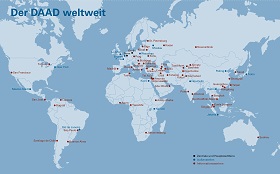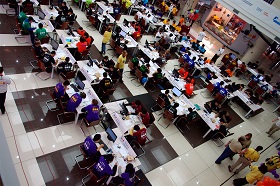The events that we are, regrettably, witnessing pose a serious challenge to the current approach to international interaction, be it in the global financial and lending system, and in education and research systems – in which universities act as key drivers of international cooperation. In a crisis of confidence, it is academic corporations that can and must act as the generators of a new quality in international cooperation, setting a positive agenda.
The events that we are, regrettably, witnessing pose a serious challenge to the current approach to international interaction, be it in the global financial and lending system, and in education and research systems – in which universities act as key drivers of international cooperation. In a crisis of confidence, it is academic corporations that can and must act as the generators of a new quality in international cooperation, setting a positive agenda.
Conflicts and universities
Every conflict is invariably followed by peace. We have, at least, ruled out the scenario under which this conflict ends in mutually assured destruction.
Recent history contains a multitude of examples of when conflicting parties (which often used to be parts of the same country) have been consciously cultivating the ‘virus’ of estrangement and enmity toward each other. Society is mobilized around a system that leaves less and less room for global, cosmopolitan and, essentially, alien elements, as has been vividly demonstrated by Russian historian Ivan Kurilla in his article Shall We Put Sanctions on Hemingway and Tolstoy? (see RBK, October 7, 2014).
While the symbolism of confrontation is simple and clear-cut, with societal demand determined expressly by this factor, when the guns fall silent, considerable efforts will be needed to overcome the animosity between the people who only recently were such entrenched opponents. However, the algorithm for peacemaking is not always within sight.
Just like all major flashpoints, the Ukraine conflict has fuelled the discourse about the return of the state-centric model to global politics, with ever more pundits insisting that many of the notorious new actors with their universal values are actually loyal instruments of particular states, with global nongovernmental and noncommercial organizations and transnational corporations falling in line with their parent-countries’ foreign policies. The same also seems true of the approach taken by global media.
The events that we are, regrettably, witnessing act pose a serious challenge to the current approach to international interaction, be it in the global financial and lending system, and in education and research systems – in which universities act as key drivers of international cooperation.
Since their emergence, universities have at all times been involved in foreign policy activities, not just as an element of national pride but also as a tool for achieving foreign policy aims through the expansion of educational and scientific presence in key target areas for international outreach and exporting educational services to strategically attractive countries. It is common knowledge that most G20 members boast a direct correlation between their foreign policies and the intensity of their international cooperation in education and science.
Global cooperation has undeniably become a norm in academic life, after all, from the historical perspective, it has not taken long for correspondence and sporadic scientific and educational meetings between leading scholars to evolve into broad, networked cooperation up to and including the establishment of international universities.
Overcoming past deadlocks
As can be seen from the process of healing the wounds incurred by France and Germany in two world wars, integration projects involving young people, cultural and academic exchanges proved immensely effective in building an atmosphere of neighborhood and mutual understanding. And to a great extent, the focus was on universities and academic corporations legitimately regarded as the bearers of humankind’s collective memory, as factors for consolidating the national idea and as the most effective opinion shapers among broad segments of the population.
The Deutscher Akademischer Austauschdienst (DAAD), the academic exchange agency that in 1950 resumed operations that had been interrupted by the Second World War is a key example here. Initially established in 1925 by several universities to promote scientific exchanges, the DAAD reemerged as a vehicle for securing the new Germany’s scientific, educational and cultural presence in the postwar world. Initially oriented toward the major players in European politics, in the early 1960s DAAD grew into a catalyst for contacts with Eastern-bloc countries after launching scientific and educational programs for Poland, Czechoslovakia and Hungary in 1958.
The need to expand Russia’s academic and educational presence in the world has been widely discussed for several years, with meaningful results detailed on the RIAC website (www.russiancouncil.ru), and in political statements made by Russia's president [1] and top officials in the Ministry for Education and Science [2]. In order to enhance this outreach to global academic and educational markets, on October 29, 2012 the Russian government issued Executive Order No. 2006-r "On Approval of the Plan for Development and Improvement of Competitiveness of Key Russian Universities among Global Centers for Science and Education." Rectors of Russian universities with international ambitions, that are active in engaging foreign students, lecturers and scientists, were also vocal [3].
All proponents of the global presence for Russian universities seem to agree that prestigious and authoritative universities can offer huge benefits both for domestic development and international clout by shaping the global agenda or at least by participating in this process.
Corporate responsibility
A modern university invariably rises above pure science and education, to work more broadly as a generator for social change, as the focal point of creativity and as a major cooperation resource. Developing a university offers a key tool for regional progress, since the university's mission also lies in developing its city, region and country. International cooperation at international level is not entirely limited to academia, as it also covers sports, festivals and cultural events. Although some believe that universities should not go beyond science and education, the academic and creative or athletic aspects of universities’ international cooperation appear equally important.
However, the current mutual mistrust between foreign policy actors creates an environment that could see the temporary cessation of nonpolitical initiatives and projects (such as the Russian-German "Petersburg Dialogue" [4] session in Sochi planned for October 28-29 2014), as they create a broad forum for developing and intensifying contacts that are not political. Today’s heated domestic environments in Russia and the EU give rise to the perception of foreign education (in both general and practical terms) as a potential threat to long-term national interests – a feeling that has been voiced by Russian and EU politicians. The cumulative effect of Russian universities’ international cooperation cannot be frozen, albeit with the hope of a thaw at some point in the future, without inflicting damage, because partnerships and networks built up over years will quickly be irretrievably broken (with competitors filling the niche) in today’s highly competitive academic and educational space.
In other words, the international crisis in confidence is just the time for universities to step in, since it is universities, and academia as a whole, that should emerge as the generators of a new quality in international cooperation through setting a positive agenda, bringing peoples and nations closer to each other and giving rise to hope for the (so far) elusive goal of world peace.
It is not difficult to describe a process that is largely reinventing the wheel – preserve and advance university contacts even with the most difficult partners making sure not to overlook immediate neighbors, launch massive student exchanges (support the Global Education program [5] and initiate other projects), help create multilateral networked projects and advance bilateral ties. In a situation like this, all platforms will do – be it the International Student Basketball League [6] or the ACM International Collegiate Programming Contest or the Baltic University Program [7].
1. Putin V. Russia and the Changing World // Rossiyskaya Gazeta. February 27, 2012. URL: http://www.rg.ru/2012/02/27/putin-politika.html
2. See the address by Russian Deputy Education and Science Minster I.I. Fedyukin to the Baltic Education Forum: http://www.strf.ru/material.aspx?CatalogId=221&d_no=49692
3. See: MGIMO-University Rector A.V. Torkunov. Education as a Soft Power Tool in Russia's Foreign Policy // MGIMO-University Bulletin No. 4 (25), 2012, pp. 85-93; Immanuel Kant Baltic University Rector A.P. Klemeshev. Comfort Better than Money // Science and Technology in Russia URL: http://www.strf.ru/material.aspx?CatalogId=221&d_no=49907; Rector of Far Eastern Federal University S.V. Ivanets. Do not Restrict Education to One University and One Country // RIAC website URL: /inner/?id_4=992#top
4. http://petersburger-dialog.ru
5. http://educationglobal.ru
6. http://isbl-basket.com
7. http://www.balticuniv.uu.se






